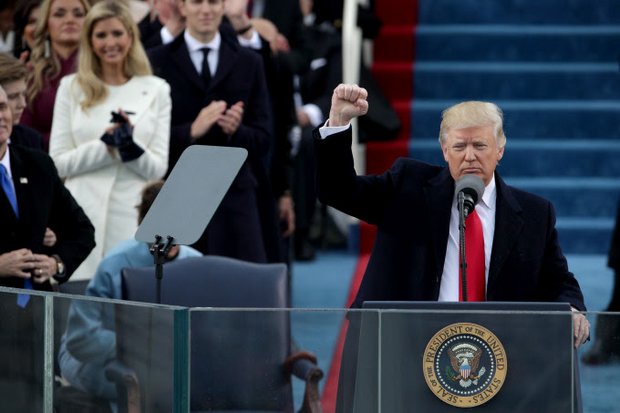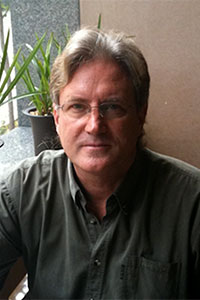
The Trump administration introduced itself to the nation and the world with a bellicose roar of "America first" and some rather petty falsehoods, establishing a strident, truculent tone.
All administrations lie, spin and deceive, but some do more of it and a better job of it than others.
Welcome to the Trump era where rudeness, in-your-face indiscretion and the interchangeability of opinion and fact is the new normal.
It's hard to imagine two leaders more different than Mr Trump and his predecessor and maybe that's the point. Just as Mr Obama coasted into power on a flood of pent-up antipathy for Bush Jr, so too Mr Trump tries to shoot the curl, riding high on an anti-Obama wave.
The transition is stark. The system is stable but not static, corrupt but not beyond redemption; it allows for an abrupt change in direction every electoral cycle or two, swinging back and forth like a pendulum.
The yin-yang of US politics proceeds apace.
Although Mr Trump plays fast and loose with the meaning of words, he wasn't being entirely ingenuous when he talked about "draining the swamp". He is going to drain the swamp -- the Obama swamp and replace it with a Trump swamp.
The sudden change in tone and style is not an existential issue; it's a balance shift. It is part and parcel of the partisan game of musical chairs that has created the semblance of stability, and a rotating oligarchy, at the heart of US politics.
What is new about Mr Trump, and not unrelated to his appeal among politically neglected social groups, the so-called "basket of deplorables" who deep-sixed Hillary's chance to keep the genteel elite game going, is his seeming unwillingness to play by the house rules.
The Trump revolution, if the installation of a cabinet of billionaires working on behalf of a corny entertainer and real estate magnate can be considered a revolution, lies not in a vision of social equality, but his bluster and unpredictability. Whether it be the media -- CNN, NBC, CBS, ABC or intelligence agencies such as the CIA, FBI, NSA or the myriad globalist organisations such as Nato, TPP, Nafta, or the UN, Mr Trump as president-elect has taken on, in a series of unexpected feints and jabs reminiscent of his guest stint as a pro-wrestler, the big guns and social Goliaths to the wow and delight of his fans.
But one only need to look at two Trump speeches side-by-side, or any two Trump tweets for that matter, to see two different characters.
His Inaugural Address, while full of bluster, was leavened with some of the ideological piquancy and rhetorical flair associated with his adviser Steve Bannon, while the cantankerous spiel he made the next day at the HQ of the Central Intelligence Agency was pure Donald mouthing off.
One speech talks about repurposing America and points at stars in the sky, while the other frets about crowd counts and TV coverage, one lays out a chilling vision of a strong paternalistic leader calling the shots, the other sounds like a crybaby in a schoolyard (where he effectively blamed CNN for ruining his friendship with the CIA).
Mr Trump's trash-talk may make him a persona non grata in the minds of more refined observers, especially in the media and academia where his overly assertive, grammar-challenged sentences provoke both head-scratching disbelief and dismal glee, but the same crude speech patterns placate those in his base who relate to what he's saying and assume, rightly or not, that his wrath will never be directed at them.
The "America first" rhetoric is a shot across the bow of the globalist system. Whether the coarsening of diplomacy will aggravate friends or intimidate enemies, it's too soon to say, but how it is responded to matters a great deal.
Inasmuch as it takes one to know one, Mr Trump will be granted a certain amount of diplomatic space from other populist leaders with xenophobic tendencies.
Brexit supporters and anti-immigrant politicians in Europe believe they have a friend in Mr Trump, Israel's Benjamin Netanyahu is emboldened and Philippine strongman Rodrigo Duterte, too, thinks he has found a kindred spirit there. A kind of tactical solidarity may yet blossom between Mr Trump and Vladimir Putin, unless as-yet unproven allegations connecting Mr Trump to the Kremlin are demonstrably proven and bring about an early end to his presidency.
One can safely assume that East Asian power relations with Mr Trump will rise and fall on the time-honoured altar of self-interest, not ideology, odd vocabulary and eccentric style. Thus, while most Americans find Mr Trump an anomaly, if not an outright embarrassment, foreign leaders need only to look through the lens of self-interest, which is what Mr Trump expects from others as much as he demands it for himself.
Assuming the self-styled master of the art of the deal is such a good bluffer that one cannot be sure when he's bluffing, international counterparts who know how to hold their cards and keep a poker face in the face of provocation may find they can play Mr Trump as well, or better, than he can play them.
Perhaps the best diplomatic model for dealing with Mr Trump is his Vice President, Mike Pence. Mr Pence showed pure cool under pressure in his debate against the hyped-up, fiery Democratic VP nominee Tim Kaine.
Mr Pence's cool serves him well with Mr Trump, too. In dealing with a lying, sinning, egomaniac of the first order, he chose not to thump on his bible.
Presenting oneself as diffident but self-assured creates less cognitive dissonance than being zealous and true.
If Mr Trump is a comical Mr Goofus, then the straight-laced Mr Pence is his comic-book counterpart, Mr Gallant. When Goofus goofs up, Gallant stands to gain.
In fact, one might say that Mr Pence, by gallantly biting his tongue during a trying campaign in which sexual scandal, conflict of business interest, and the dodging of tax transparency came to the fore not only managed to stay in the good graces of his intemperate boss but has elucidated the path by which he might succeed him.
Philip J Cunningham is a media researcher covering Asian politics.
